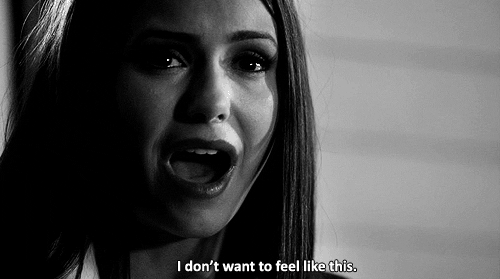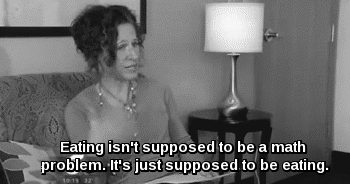
CONTENT WARNING: This article deals with thoughts of suicide, eating disorders and mental illness.
Mental health difficulties have been getting a lot more attention lately and it’s honestly brilliant to see that people are beginning to get a greater understanding of what it’s like. But that attention tends to be focused on the big D & A: depression and anxiety.
Obviously these conditions affect a significant amount of people and they definitely should be spoken about more candidly and frequently, but there are a lot of other mental health difficulties that fly under the radar.
Before launching in, it’s important to remember that people aren’t defined by a mental health difficulty they may be experiencing.
Understanding more about a particular set of difficulties can help to break down barriers, increase understanding, increase connection and enable people to live meaningful lives with those they care about.
1. Bipolar
Bipolar is different to general mood changes or anger outbursts. Bipolar disorder is a type of mood disorder in which people have times of low mood (clinical depression) and times of ‘high’ or elevated mood (mania). These episodes or changes last at least a week and affect the way a person thinks, feels and acts.
A depressive episode is a period of lowered mood, with changes in thinking and behaviour that usually lasts for at least two weeks, while a manic episode is a period of constant and unusually elevated (‘high’) or irritable mood and a noticeable increase in energy or activity. This generally lasts at least one week and is very different from someone’s normal state.
A support plan will usually involve a combination of medication and psychological therapies. Your GP or psychiatrist can help you to find a medication that works for you. Psychological therapies can help you to understand your mood patterns, manage difficult thoughts and feelings, and develop a plan to avoid becoming unwell in the future.

2. Attention Deficit Hyperactivity Disorder
You’ve probably heard people refer to ADHD as the disorder that kids who can’t keep still have – and while sometimes that may be true, it’s so much more than that. Essentially, despite a young person’s best efforts, it can have a huge impact on concentration, ability to cope in school or learning environments and have a big impact on relationships within the family.
Doctors still aren’t entirely sure what causes ADHD, which doesn’t help it being so misunderstood, but what we do know is that symptoms generally include inattention (difficulty concentrating, forgetting instructions, moving from one task to another without completion), impulsivity (talking over the top of others, losing control of emotions easily, being accident prone, acting without thinking) and overactivity (constant fidgeting and restlessness).
If you or someone you know is experiencing ADHD, seeing a professional who has experience with helping patients with ADHD can have a big impact, especially considering that the recovery process will often include a plan between someone experiencing ADHD, their parent(s) or support people, their school, workplace or learning environment and a GP.
3. Eating disorders
Disordered eating affects a significant amount of people, particularly young people, and the sooner someone experiencing them asks for help and professional support, the faster recovery can be. Whether you have anorexia, bulimia, body dysmorphia or others, it’s vital that you get on top of it as soon as possible.
There are plenty of factors that contribute to the development of an eating disorder, including a family history, low self-esteem, external/social pressures or influences, stress, dieting and more.
What’s important to remember though is that many people with disordered eating feel that their experiences aren’t bad enough, or they aren’t “thin enough” to need professional help – this is objectively untrue. No matter what a person weighs, how much or little they eat, anybody experiencing unhealthy eating patterns and distress about how they look should seek professional support.

4. Borderline Personality Disorder
Borderline Personality Disorder is a term used to describe a pattern of difficulties someone can have. Some of these include problems in managing emotions, difficulties with how someone might see themselves, relationship difficulties, and problems with impulsive behaviour. These experiences can be really distressing.
Young people experiencing BPD can find it helpful to have a professional diagnosis, ‘coz it can help make sense of some really difficult experiences they’ve been having, and help them to find new ways of managing. It can also be very useful for family and friends to know what is likely to be helpful, and what isn’t, and therefore be better able to provide support.
BPD is treatable. As with many mental health difficulties, knowing the signs, seeking professional diagnosis and accessing support early can really help with recovery. Recovery includes working with a mental health professional, and usually includes a GP and family.
5. Post Traumatic Stress Disorder
People who experience Post Traumatic Stress Disorder have been through a traumatic event that threatened their life or safety, or the lives and safety of the people around them, and thus has an incredibly impactful effect on their emotional state. Up to 57% of Australians experience a traumatic event at some stage in their lives.
Young people respond to traumatic events in different ways. This entirely depends on the individual, their past experiences, levels of support and the nature of the event. What happens after traumatic events are normal responses to ‘not normal’ events.
Many people affected by traumatic events are able to recover naturally and learn ways to manage daily, but sometimes additional support may be needed. If you experience distressing reminders of the event (dreams or flashbacks), avoidance of things that remind you of the event, or overall changes to your mood and thoughts, you should reach out for support.

Mental health difficulties can be incredibly hard to deal with, and you may find that it takes a long time to really get past what’s affecting you. Just know that with support from those around you (in addition to professional support if you need it), you can manage.
The important thing is not to define yourself by your mental health difficulties, coz there’s so much more than just that.
If you or someone else needs support in a crisis situation please call Lifeline on 13 11 14 or the police on 000 for emergency support.




